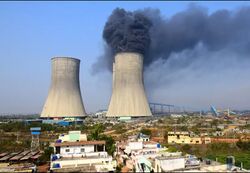SO2 and NOx emissions due to increasing cold fire from thermal power station has lead to 60 per cent rise in the number of annual premature deaths in India: Difference between revisions
No edit summary |
(Updated problems) Tag: Reverted |
||
| Line 1: | Line 1: | ||
{{Problem | {{Problem | ||
|Description= | |Description=The emission of SO2 and NOx from thermal power stations has resulted in a significant increase in the number of premature deaths in India. The rising cold fire has led to a 60% surge in annual fatalities. The toxic gases released from these power stations have severe health implications, including respiratory diseases, heart ailments, and cancer. The lack of proper measures to control emissions has worsened the situation, posing a significant threat to public health. The need of the hour is to adopt sustainable energy practices and reduce dependence on fossil fuels to mitigate the adverse effects of thermal power stations on human health. | ||
The | |||
|Region=India | |Region=India | ||
|country=India | |country=India | ||
|coordinate=20.593684, 78.96288 | |coordinate=20.593684, 78.96288 | ||
}} | }} | ||
Revision as of 20:48, 3 July 2023
This Problem
needs your help
Region: India
India’s plans to expand its coal fleet by 65 megawatts (MW) by 2030 could lead to a 60 per cent rise in the number of annual premature deaths due to air pollution in five major cities, a new study has found. The coal fleet expansion could result in 52,700 premature deaths, 31,300 preterm births, 46,800 asthma emergency hospital visits in the cities of Mumbai, Bengaluru, Chennai, Kolkata, and Delhi in the next decade, the study said.
The study was modelled around two scenarios, one where greenhouse gas emissions are reduced in line with the Paris Agreement, which aims to limit the rise of global temperatures to 1.5 degrees above pre-industrial levels. The second is if countries go ahead with their current coal plans, which takes into account coal plants in the pipeline and those scheduled to retire by 2050.
To contribute to limiting global temperatures to a 1.5 degree rise, India’s coal use must peak “at the latest this year, and reduce by 20% between 2021 and 2030, with the entire fleet of Indian coal plants being retired by the year 2045 to reduce emissions in line with a 1.5 degree C climate scenario,” the study said.
“By continuing to support coal-fired power plants, national and state governments are threatening the health and well-being of all those living in major Indian cities while undermining India’s air quality targets. India’s current national coal policies fall dramatically short given that current plans would expand the coal fleet by 28% between 2020 and 2030 not reduce it by 20%, which global 1.5 oC-compliant climate targets require. Current coal plans could increase the number of annual premature deaths from coal-related air pollution in major Indian cities by 60%,” Dr Rachel Huxley, Head of knowledge and research at C40, said in a statement
Solutions to this problem
Add Solution/Link Solution
Sub Problems
Projects
